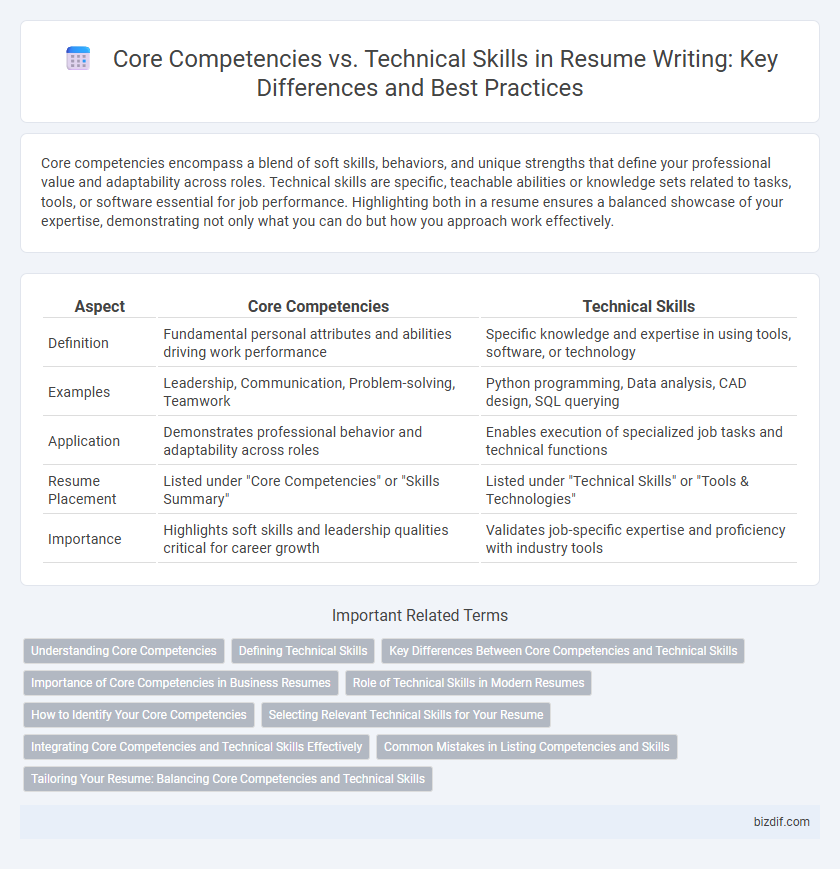Core competencies encompass a blend of soft skills, behaviors, and unique strengths that define your professional value and adaptability across roles. Technical skills are specific, teachable abilities or knowledge sets related to tasks, tools, or software essential for job performance. Highlighting both in a resume ensures a balanced showcase of your expertise, demonstrating not only what you can do but how you approach work effectively.
Table of Comparison
| Aspect | Core Competencies | Technical Skills |
|---|---|---|
| Definition | Fundamental personal attributes and abilities driving work performance | Specific knowledge and expertise in using tools, software, or technology |
| Examples | Leadership, Communication, Problem-solving, Teamwork | Python programming, Data analysis, CAD design, SQL querying |
| Application | Demonstrates professional behavior and adaptability across roles | Enables execution of specialized job tasks and technical functions |
| Resume Placement | Listed under "Core Competencies" or "Skills Summary" | Listed under "Technical Skills" or "Tools & Technologies" |
| Importance | Highlights soft skills and leadership qualities critical for career growth | Validates job-specific expertise and proficiency with industry tools |
Understanding Core Competencies
Core competencies represent an individual's fundamental strengths and abilities that drive effective performance across various roles, such as leadership, problem-solving, and communication. Unlike technical skills, which involve specific knowledge or expertise related to tools, software, or methodologies, core competencies emphasize behavioral attributes and cognitive capabilities. Understanding core competencies enables job seekers to showcase transferable qualities that align with organizational values and long-term success.
Defining Technical Skills
Technical skills refer to specific knowledge and abilities required to perform tasks related to technology, software, tools, or processes within a particular profession. These skills often include proficiency in programming languages, software applications, data analysis, and machinery operation. Defining technical skills precisely on a resume helps employers quickly identify a candidate's capability to handle job-specific tools and technologies effectively.
Key Differences Between Core Competencies and Technical Skills
Core competencies encompass an individual's overarching abilities, such as problem-solving, leadership, and communication, which are essential for various professional roles. Technical skills refer to specific knowledge and expertise related to particular tools, software, or methodologies used within a job, such as coding languages, data analysis, or machinery operation. Understanding the distinction helps tailor resumes by highlighting both transferable strengths and job-specific proficiencies to align with employer requirements.
Importance of Core Competencies in Business Resumes
Core competencies in business resumes highlight crucial attributes such as leadership, strategic thinking, and communication that drive organizational success. Unlike technical skills, core competencies emphasize transferable qualities essential for managing teams and making impactful business decisions. Showcasing these competencies effectively positions candidates as valuable assets capable of contributing to company growth and long-term objectives.
Role of Technical Skills in Modern Resumes
Technical skills play a crucial role in modern resumes by showcasing an applicant's proficiency with specific tools, software, and technologies relevant to the job. Highlighting these skills ensures compatibility with applicant tracking systems (ATS) and demonstrates the candidate's readiness to perform job-specific tasks efficiently. Core competencies typically reflect broader abilities, while technical skills provide concrete evidence of expertise in particular technical domains.
How to Identify Your Core Competencies
Identify your core competencies by analyzing your unique combination of knowledge, skills, and abilities that deliver consistent value across various roles and industries. Focus on strengths that differentiate you, such as leadership, problem-solving, and communication skills, rather than job-specific technical abilities. Reflect on past achievements and feedback to uncover areas where you consistently excel and add measurable impact.
Selecting Relevant Technical Skills for Your Resume
Selecting relevant technical skills for your resume involves tailoring the skills section to match the job description and industry requirements, highlighting proficiencies in software, programming languages, and tools directly applicable to the role. Core competencies reflect broader professional attributes like leadership, communication, and problem-solving, while technical skills demonstrate your hands-on expertise with specific technologies or methodologies. Prioritizing the most relevant technical skills ensures your resume passes applicant tracking systems and grabs the attention of hiring managers.
Integrating Core Competencies and Technical Skills Effectively
Integrating core competencies and technical skills effectively enhances a resume by demonstrating both strategic abilities and practical expertise. Highlighting problem-solving, communication, and leadership alongside software proficiencies and industry-specific tools creates a well-rounded profile that appeals to employers. Emphasizing measurable achievements and relevant certifications further strengthens the connection between core strengths and technical capabilities.
Common Mistakes in Listing Competencies and Skills
Common mistakes in listing core competencies versus technical skills include conflating soft skills such as communication and leadership with hard technical abilities like programming languages and software proficiency. Job seekers often overuse generic terms instead of tailoring competencies to specific industry requirements, reducing the impact of their resumes. Properly distinguishing and categorizing core competencies and technical skills enhances clarity and improves keyword optimization for applicant tracking systems (ATS).
Tailoring Your Resume: Balancing Core Competencies and Technical Skills
Tailoring your resume requires a strategic balance between core competencies and technical skills to align with job requirements effectively. Emphasize core competencies like leadership, communication, and problem-solving to demonstrate adaptability and soft skills, while showcasing technical skills such as programming languages, software proficiency, or data analysis tools to highlight specialized expertise. Customizing this balance enhances ATS compatibility and appeals to both hiring managers and automated screening systems.
Core Competencies vs Technical Skills Infographic

 bizdif.com
bizdif.com